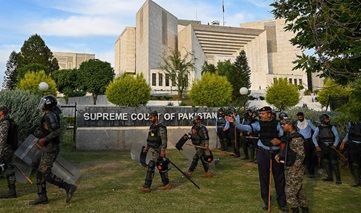Pakistan Federal Minister for Defense Khawaja Asif has said he supported the government’s decision to authorise Pakistan’s premier spy agency, the Inter-Services Intelligence (ISI), to intercept phone calls, emphasising it was essential “under the current circumstances” as the country strives to eradicate militant violence.
In a notification issued, Pakistan’s information technology ministry said the government had authorised the ISI to tap phone calls and messages “in the interest of national security,” adding to the already outsized role and powers of the shadowy military outfit.
The notification was described as a “black law” by the opposition parties, with former prime minister Imran Khan’s Pakistan Tehreek-e-Insaf (PTI) saying “national security” had no clear definition and could mean anything.
“In matters of national security, this measure becomes necessary and should be supported by everyone,” the minister said during a conversation with Independent Urdu. “At the very least, during the ongoing war against terrorism, this action is essential. I fully support it under the current circumstances.”
He dismissed criticism from the opposition, saying the PTI members should recall Khan’s statements over the issue who justified phone tapping during his own stint in power.
“Previously, they themselves advocated for phone tapping, both theirs and others’, and happily said it should be done,” he added.
Barrister Gohar Khan, the PTI chairman, told Independent Urdu the constitution guaranteed the privacy of all citizens, saying that only the people involved in criminal activities could be subjected to such surveillance.
“Such a blanket notification violates the constitution,” he added. Asked about Khan’s own support for phone tapping while he was in power, the PTI leader said: “Whatever it is, it should be according to the constitution.”
Meanwhile A petitioner has approached the Lahore High Court (LHC) against the federal government’s decision to empower the country’s prime intelligence agency—the Inter-Services Intelligence (ISI)—to conduct surveillance of citizens’ phone calls.
Citizen Fahad Shabbir has filed a petition through Advocate Nadeem Sarwarm naming the prime minister, the federal government, and the Pakistan Telecommunication Authority (PTA), among others, as respondents.
The petitioner argued that the Government of Pakistan has, through a notification, permitted the ISI to tap people’s phones. However, the section of the PTA act— Section 56—under which this notification has been issued does not yet have established rules.
It said the Constitution of Pakistan provides citizens with privacy and freedom of expression.
The petitioner requested the court to declare the notification allowing the ISI to tap phones as illegal, adding that according to the Indian Supreme Court, tapping people’s phones also violates their constitution.
The court is requested to suspend the implementation of the said notification until the final decision on the current petition. The government should be directed to establish rules for Section 56 of the PTA act, it added.








